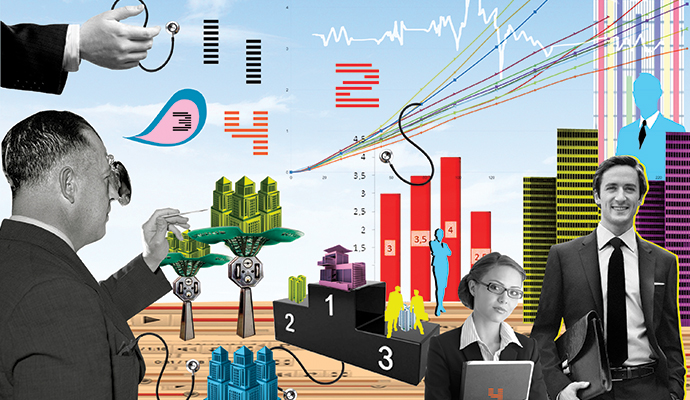Buffett’s Warning on Economic Gloom
The billionaire investor’s latest annual letter provides an important insight on the divergent fortunes of companies and individuals.
On February 27, Warren Buffett, the folksy billionaire who presides over Berkshire Hathaway, released his much-anticipated annual letter to the company’s shareholders. Most of the media coverage focused on the Oracle of Omaha’s contention that, despite the aura of decline promulgated by many, the U.S. is actually in very good shape. “For 240 years, it’s been a terrible mistake to bet against America, and now is no time to start. America’s golden goose of commerce and innovation will continue to lay more and larger eggs,” he wrote. This is a stance with which I agree. Welcome to the bandwagon, Mr. Buffett!
But I found another, less-covered point he made to be more compelling. He attributes at least part of the generally sour public mood about the U.S. economy to the divergent fates of companies and individuals as the economy expands. The stock market has soared and companies have reinvented themselves and found new markets, but corporate profits as a percentage of GDP are at a historic high. Moreover, wages have been generally flat. And even with unemployment low and millions of job openings, people feel a great deal of insecurity. In a recent CNN poll, 56 percent of Americans said they feared their children would be worse off than they are.
Put another way, the age of disruption, globalization, and rapidly shifting markets has actually been quite good news for companies at large — and for their owners. But it has been less good news for many of the people who work at them. And as they approach such challenges, companies and individuals have substantially different resources and capabilities at their disposal. In his letter, Buffett pointed out this dichotomy. “Both capital and labor can pay a terrible price when innovation or new efficiencies upend their worlds,” Buffett noted. “We need shed no tears for the capitalists (whether they be private owners or an army of public shareholders). It’s their job to take care of themselves.”
And they generally do. Companies, even very large ones, can be very deft and nimble. They can diversify, so they’re not exposed to the prospects of a single business or a single market. If sales fall, they can temporarily cut dividends, reduce capital expending, freeze wages, and, in a pinch, renegotiate debt. When a line of business goes south, they can sell it — and then use the proceeds to invest in one with better prospects. If there’s a technological or strategic capability they need to acquire, they can buy it overnight. If one market shrinks and another looks promising, they can rapidly deploy resources so that they can participate in that growth. A 100-year-old company can reinvent itself substantially in an instant for a new era.
Individuals, by contrast, have many fewer levers to pull. “A long-employed worker faces a different equation,” as Buffett noted. If you have spent 30 years acquiring skills in a particular profession or trade and the market dries up, you can’t simply acquire new ones instantly. It might take years. If a business in Massachusetts closes down but there are options in the same industry in, say, Malaysia, it is hard for a person simply to pick up and move there — he’ll face language, citizenship, and legal barriers. And so the challenges of disruption are more pronounced, and the opportunities presented by globalization are simply less available, to the typical worker than to the typical company. In his letter, Buffett highlighted the fact that a shoe company owned by Berkshire Hathaway moved its production to Asia, which put 1,600 people out of work. “Many were past the point in life at which they could learn another trade. We lost our entire investment, which we could afford, but many workers lost a livelihood they could not replace.”
Too often, leaders are glib about this dichotomy. Some people would respond to such developments by putting the brakes on globalization and technology. But, Buffett correctly notes, “the answer in such disruptions is not the restraining or outlawing of actions that increase productivity.” We shouldn’t expect companies to take the responsibility for protecting workers from disruptions over the long term. It’s too much to expect that, for example, an embattled coal company will have the resources to retrain its workers for alternate careers if it has to shut its mines.
We shouldn’t expect companies to take the responsibility for protecting workers from disruptions over the long term.
The answer, Buffett says, is for society at large to do a better job building shock absorbers that protect all people in times of need. “The solution, rather, is a variety of safety nets aimed at providing a decent life for those who are willing to work but find their specific talents judged of small value because of market forces,” he wrote. Buffett singled out the Earned Income Tax Credit as one such useful policy. But broader efforts to protect healthcare, to promote lifelong education and training, and to encourage savings would also be useful.
Of course, such programs have a cost. And Buffett would be the first to acknowledge that they do. But he’s highlighted an important point: If you’re not taking into account the impact of your company’s actions on society at large, you may be contributing to the sour mood.




